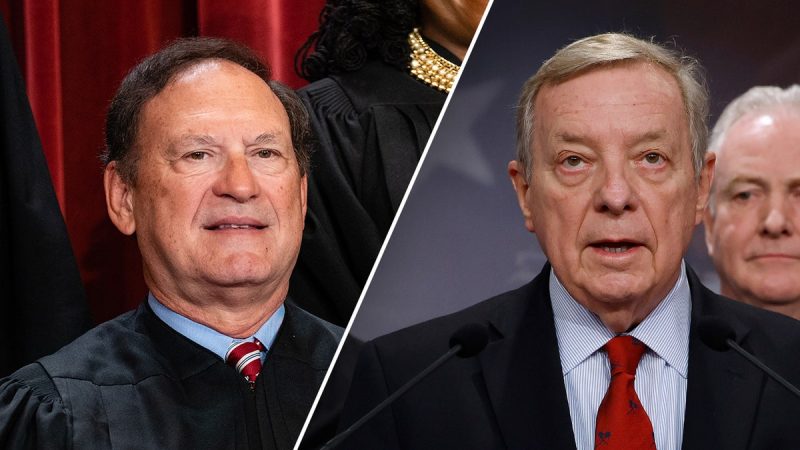Sen. Durbin Demands Justice Alito Recuse From Trump Cases After Flying Upside Down U.S. Flag
The recent call for Justice Alito to recuse himself from cases involving former President Trump has raised concerns within the legal and political spheres. Senator Dick Durbin, a Democrat from Illinois, has publicly stated that Justice Alito’s display of an upside-down U.S. flag warrants his removal from any cases related to Trump’s legal matters. This bold demand marks a significant escalation in the ongoing debate over judicial impartiality and the role of political ideology in the judiciary.
The uproar began when Justice Alito was spotted flying an upside-down American flag outside his residence, a symbol traditionally used to signal distress. While the justice has yet to provide a formal explanation for this action, speculations and interpretations have run rampant. Some see it as a deliberate statement of defiance or protest, while others believe it was a simple mistake or oversight. Whatever the true intent behind the display, Senator Durbin wasted no time in seizing upon it as grounds for recusal.
Durbin’s call for Justice Alito’s recusal is not without precedent. The ethical standards for federal judges require them to maintain impartiality and avoid even the appearance of bias in their judicial duties. Any actions or statements that could undermine public confidence in a judge’s impartiality are cause for recusal. By implicitly linking his flag display to a potential bias in Trump-related cases, Durbin has raised serious questions about Justice Alito’s ability to fairly preside over such matters.
The implications of this demand extend beyond Justice Alito and the Trump cases. The ongoing politicization of the judiciary has cast a shadow over the perceived independence and neutrality of the courts. Partisan attacks on judges, coupled with high-stakes legal battles involving powerful political figures, have eroded public trust in the judicial system. Senator Durbin’s call for recusal is a stark reminder of the challenges facing the judiciary in an increasingly polarized and contentious environment.
At the heart of this controversy is the fundamental question of judicial integrity. Can judges set aside their personal beliefs and political affiliations to administer justice impartially? Should their extrajudicial actions or expressions be scrutinized for potential bias? These are complex issues that go to the core of the legal system’s legitimacy and credibility. Senator Durbin’s demand for Justice Alito’s recusal forces us to confront these questions head-on and consider the implications for the rule of law.
In the coming days, the debate over Justice Alito’s recusal is likely to intensify, drawing in a diverse range of voices from the legal, political, and public spheres. The outcome of this controversy will have far-reaching consequences for the judiciary’s reputation and the broader dynamics of power and accountability in American democracy. As we navigate these turbulent waters, one thing is clear: the need for a fair, impartial, and independent judiciary has never been more urgent.




























